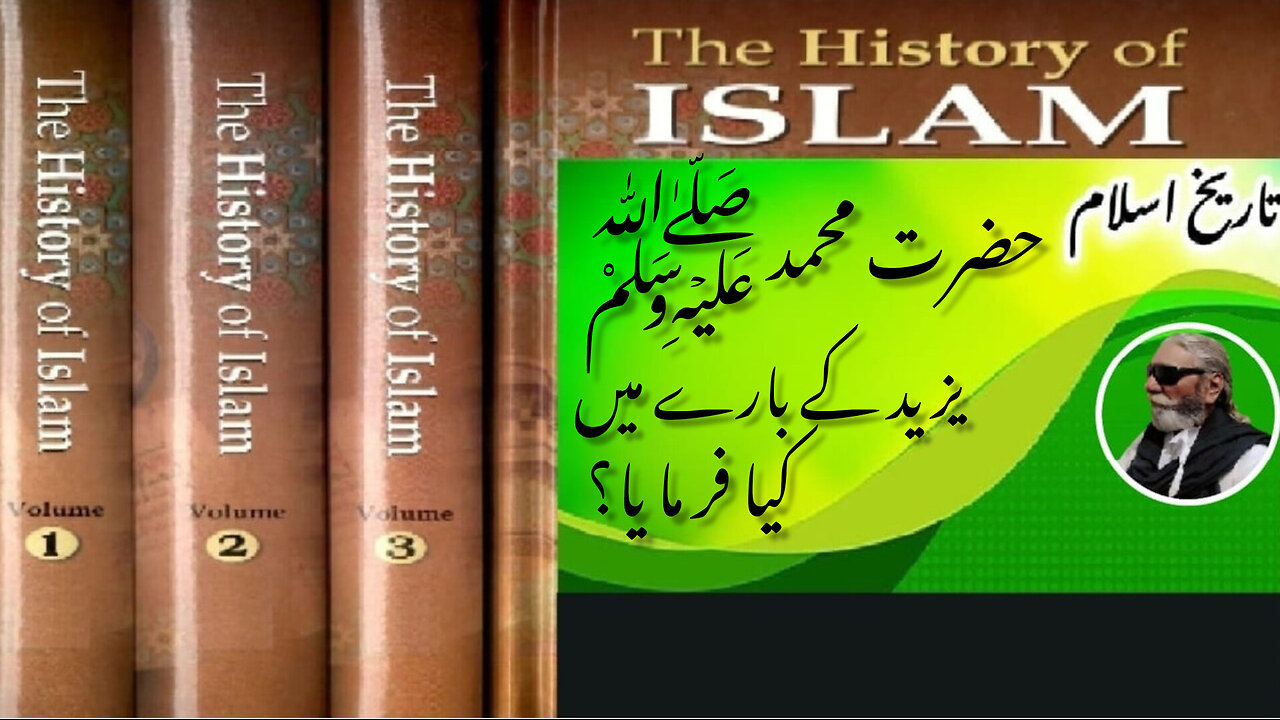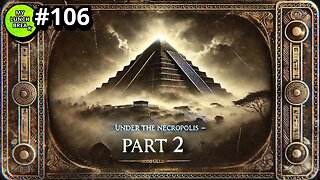Premium Only Content

Prophet Muhammad's WARNING About Yazid Will SHOCK You
@islamichistory813 #prophetswarning #karbala #martyrdom #shocking
Asslamoalaikum sisters brothers friends and elders, today we are discribing that Prophet Muhammad's WARNING About Yazid Will SHOCK You
Discover the Prophet Muhammad's (PBUH) powerful warning about Yazid that will leave you shocked and intrigued. In this video, we delve into what the Prophet Muhammad (PBUH) said regarding Yazid, shedding light on an important historical event that holds significant lessons for us today. Join us as we explore the profound insights shared by the Prophet Muhammad (PBUH) and uncover the truth behind this crucial message. Watch now to learn more about this compelling topic.
Having seen Yazid’s perversities cited by prominent Sunni authorities, let us now look at the contents of the Traditions of the Prophet (S), as reported by the Sunni authorities
For our purposes today, we shall dwell upon only those Traditions reported in Sahih Bukhari. As known by the majority of the people, to the Sunnis as well as the Wahabis, this book is regarded as the most authentic, surpassed only by the Holy Quran. To them, Traditions from this book are most reliable, beyond any doubt!
In Tradition Number 180 on page 147 of Volume Nine, it is stated that: “Amr bin Yahya bin Said bin Amr bin Said said: ‘My grandfather narrated to me thus: I was in the company of Abu Hurayra and Marwan in the mosque of the Prophet (S) in Madina. Abu Hurayra then said: I heard the truthful and trusted by Allah (i.e. the Prophet (S)) saying, “The destruction of my followers will be through the hands of young men from Quraish.” Marwan retorted: ‘May the curse of Allah be on these youths.’ Abu Hurayra said: If I could, I would have named these youths, and their parentage.’ Accompanied by my grandfather, I went to Syria to meet the progeny of Marwan at the time when they were the rulers there. Whenever my grandfather saw that these rulers were young men, he would tell us: Probably, these are among them (those young men mentioned by the Prophet (S)), and we used to reply, saying, You know better than us’.”
Before quoting the explanations of the above mentioned Tradition, those working with the English version should note that it does not fully correspond with the original Arabic text. The translator has omitted the significant part of the Tradition, printed in italics above, in the English version -- advertently or inadvertently.
Nonetheless, in his book, Fat’hul Baari, on page 10 of Chapter Thirteen, Imam Ibn Hajar Al Asqalaani mentions a narration of Ibn Abi Shayba which says that: “Abu Hurayra used to go to the market saying: ‘O Lord! Do not let me live to the year 60 A. H. nor witness the reign of the youths.’” Having said this, Imam Ibn Hajar adds, “In these words there is an indication that the first youth to come to power was in the year 60 A. H., and indeed, this is what actually happened. Yazid bin Muawiya’s succession took place in that year, and he remained in power till his death in 64 A. H. He was succeeded by his son, Muawiya, who died after a few months.”
Therefore, according to Imam Ibn Hajar, among “the Quraish youths” prophesized by the Prophet (S) to be the ones through whose hands the destruction of his followers would be, and whom Abu Hurayra wished the Almighty to keep him away from in the year 60 A. H., was Yazid. Did the Prophet’s prediction prove wrong? Wasn’t the Prophet’s community led astray through the massacres of Karbalaa, Madina and Macca as expounded hitherto? Or were those who were killed there polytheists and not Muslims? Despite all these, do we still insist that Yazid was Amirul Mu’minin?
Remember: Abu Hurayra did not disclose the names and the parentage of the Quraishi youths, not because he did not know them, but because he feared that if he did so he would endanger his life. This becomes clear when we revert to Sahih Bukhari (Tradition Number 121 on page 89 of Volume One). Which says: Narrated by Abu Hurayra: I have memorised two kinds of knowledge from Allah’s Apostle (S) I have propagated one of them to you and if I propagated the second, then my pharynx (throat) would be cut (i.e. killed).’”
Commenting on this Tradition, on page 216 of Chapter One of Fat’hul Baari, Imam Ibn Hajar says: “Scholars believe that the knowledge that Abu Hurayra did not disclose, relates to the Tradition in which names, life-style and the times of the evil monarchs have been mentioned. Abu Hurayra used to make a tacit reference about some of them, but would never mention their real names, fearing for his own life. For instance, by seeking refuge in the Almighty from year 60 and from the reign of the youths, he was making a tacit reference to the kingship of Yazid bin Muawiya whose reign was in the year 60 A.H.”
However, Imam Ibn Hajar was not the only person to draw this conclusion. Shihaabuddin Ahmad Al Qastwalaani too comes out with a similar interpretation of these Traditions. Those who know Arabic may refer to page 374 of Chapter One, and pages 11-12 of Chapter Fifteen of Irshaadus Saari.
Abu Hurayra, therefore, did not name Yazid, not because he did not know it, but because he was afraid that if he did so, his life would be in danger. In other words, he observed taqiyya (dissimulation)!
Was Abu Hurayra alone in practising taqiyya or others, too, observe it? We shall see that in the next chapter.
===============================================
-
 1:49:50
1:49:50
Winston Marshall
2 days agoThe DARK Reality of Socialism - Historian Giles Udy
3.48K30 -
 LIVE
LIVE
Sports Wars
1 hour agoBengals STAY ALIVE In OT Thriller, ESPN's Ryan Clark SLAMMED, NFL DESTROYS NBA On Christmas
545 watching -
 9:37
9:37
EvenOut
19 hours ago $1.02 earnedThe Non-Reflecting Mirror Scare Twin Prank!
6.65K1 -
 11:19
11:19
Tundra Tactical
18 hours ago $1.45 earnedI Saw How CMMG Makes Guns.
9.1K5 -
 15:34
15:34
Misha Petrov
13 hours agoReacting To TikTok’s Most DELUSIONAL Takes!
7.42K14 -
 1:52:24
1:52:24
Squaring The Circle, A Randall Carlson Podcast
1 day ago#032 Flournoy Holmes' Artwork Helped Define The Southern Rock Phenomenon of The Early 1970's
6.25K3 -
 19:56
19:56
inspirePlay
1 day ago $0.01 earnedWalking with Lions & Facing Africa’s Wild Side | Safari Adventure with the Grid Championship Crew!
2.57K -
 10:50
10:50
RTT: Guns & Gear
1 day ago $0.34 earnedBudget Friendly Carry 2011: EAA Girsan Brat 2311
5.4K3 -
 3:49:06
3:49:06
Alex Zedra
15 hours agoLIVE! New Game | Nuclear Nightmare
102K13 -
 25:08
25:08
MYLUNCHBREAK CHANNEL PAGE
1 day agoUnder The Necropolis - Pt 2
280K64